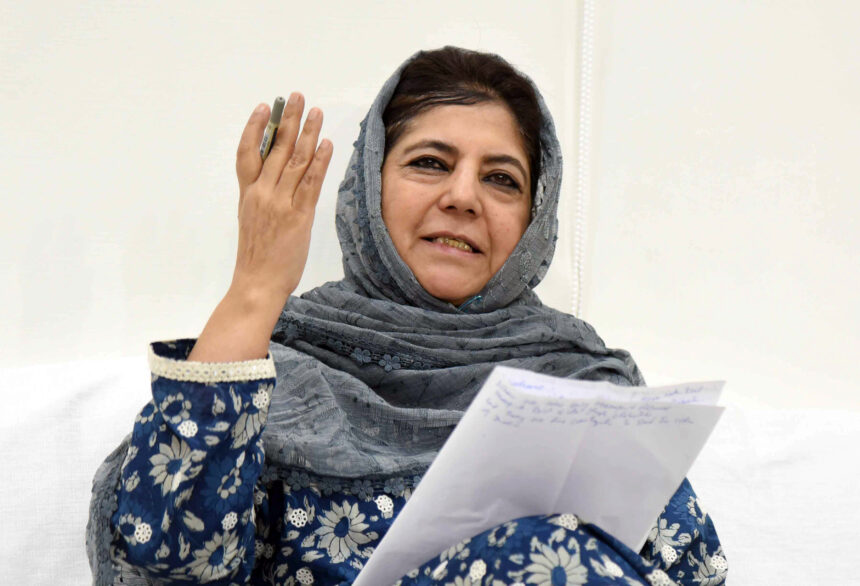Mehbooba Mufti’s Vision: Transforming Jammu & Kashmir into a Bridge of Peace Between India and Pakistan
Srinagar 31 May 2025: In a region long marred by conflict and political strife, Mehbooba Mufti, former Chief Minister of Jammu and Kashmir and president of the People’s Democratic Party (PDP), has emerged as a steadfast advocate for peace. Amid escalating tensions between India and Pakistan, Mufti’s recent statements emphasize the need for Jammu and Kashmir (J&K) to serve as a conduit for friendship rather than a battleground for hostility. Her vision calls for a paradigm shift in how the region is perceived and utilized, advocating for dialogue, economic cooperation, and cultural exchange as tools for lasting peace.
The Historical Context: A Region Caught in the Crossfire
Jammu and Kashmir’s strategic location has made it a focal point of India-Pakistan relations since the partition in 1947. The region has witnessed multiple wars, insurgencies, and political upheavals, often bearing the brunt of hostilities between the two nations. The abrogation of Article 370 in 2019, which granted special autonomy to J&K, further complicated the situation, leading to increased tensions and a clampdown on civil liberties.
Mehbooba Mufti’s Call for Peace
Advocating for Dialogue Over Conflict
Mufti has consistently emphasized the importance of dialogue between India and Pakistan, as well as with the people of J&K, to resolve longstanding issues. She argues that sustainable peace can only be achieved through inclusive conversations that address the aspirations and grievances of all stakeholders. Her stance challenges the prevailing narrative that often sidelines the voices of those most affected by the conflict.
Critique of War Rhetoric
In response to recent calls for intensified military action against Pakistan, Mufti has warned against the dangers of war-mongering. She likens J&K to “grass trampled under the feet of two fighting elephants,” highlighting how the region suffers disproportionately during escalations. Her criticism extends to political entities that, in her view, exploit nationalist sentiments for electoral gains, thereby perpetuating a cycle of violence and instability.
The Indus Waters Treaty Suspension: A Flashpoint
Background of the Treaty
The Indus Waters Treaty (IWT), signed in 1960, is a water-sharing agreement between India and Pakistan, brokered by the World Bank. It allocates control over the six rivers of the Indus basin between the two countries. Despite enduring multiple conflicts, the treaty has been a rare example of sustained cooperation.
Recent Developments
Following a terrorist attack in Pahalgam in April 2025, India accused Pakistan of violating the IWT by supporting cross-border terrorism. Consequently, India suspended the treaty, citing national security concerns. This move has significant implications for Pakistan, particularly in its agriculturally vital Punjab province, which relies heavily on Indus waters for irrigation.
Mufti’s Perspective
Mufti has expressed concern over the suspension of the IWT, arguing that such actions exacerbate tensions and harm ordinary citizens. She emphasizes that political disputes should not translate into punitive measures that affect the livelihoods of people, advocating instead for diplomatic solutions that prioritize human welfare.
Economic Implications of Prolonged Conflict
Impact on Regional Development
The persistent state of conflict in J&K has stifled economic growth and deterred investment. Tourism, once a significant contributor to the region’s GDP, has suffered due to security concerns. Infrastructure projects and employment opportunities have also been adversely affected, leading to widespread unemployment and disillusionment among the youth.
Mufti’s Vision for Economic Revival
Mufti posits that peace and stability are prerequisites for economic development. She advocates for policies that promote cross-border trade, tourism, and cultural exchange, which can revitalize the region’s economy and foster mutual understanding. By transforming J&K into a hub of cooperation, she envisions a future where prosperity replaces conflict.
Cultural Exchange as a Tool for Peace
The Role of People-to-People Contact
Historically, cultural exchanges between India and Pakistan have served as informal channels of diplomacy, fostering goodwill and understanding. Initiatives like the Karavan-e-Aman bus service and cross-border trade routes have connected communities divided by political boundaries.
The Current Cultural Cold War
Recent political developments have led to a near-complete severance of cross-border cultural ties. Visa denials, censorship, and high tariffs have curtailed artistic collaborations, leading to a cultural cold war that mirrors the political standoff.
Mufti’s Advocacy for Cultural Diplomacy
Mufti underscores the importance of cultural diplomacy in bridging divides. She calls for the revival of people-to-people contacts, arguing that shared cultural experiences can humanize the ‘other’ and lay the groundwork for political reconciliation.
Political Reactions and the Road Ahead
Domestic Political Landscape
Mufti’s peace-oriented stance has drawn criticism from political opponents who accuse her of being soft on national security. However, she maintains that true security lies in addressing the root causes of conflict and engaging in meaningful dialogue.
International Implications
The suspension of the IWT and the hardening of positions on both sides have raised concerns about regional stability. International actors, including the World Bank, have expressed reluctance to intervene, highlighting the need for bilateral solutions.
Prospects for Dialogue
Despite the current impasse, Mufti remains hopeful about the prospects for dialogue. She urges both governments to prioritize diplomacy over confrontation, emphasizing that the well-being of millions depends on their ability to resolve differences peacefully.
Bottom-Line
Mehbooba Mufti’s vision for Jammu and Kashmir as a bridge of peace between India and Pakistan offers a compelling alternative to the prevailing narratives of hostility and suspicion. Her emphasis on dialogue, economic cooperation, and cultural exchange underscores the potential for a more harmonious future. While challenges remain, her advocacy serves as a reminder that sustainable peace is achievable through inclusive and empathetic engagement.


